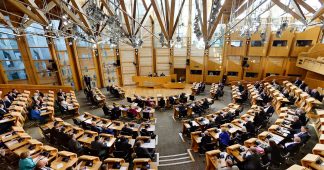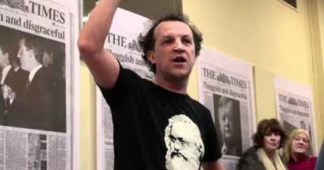By Steve James
The Scottish National Party (SNP) is likely to emerge as the largest party in Scotland following the June 8 UK general election.
Its 48-page manifesto, “Stronger for Scotland,” emphasises the party’s role as responsible Westminster parliamentarians, advocates of fiscal prudence, austerity, support for Scottish-based capitalism, increased arms spending and retention of European Union (EU) Single Market access.
To make clear the party’s bona-fides to big business, SNP leader and Scottish First Minister Nicola Sturgeon hailed her commitment to “balance the UK budget for day to day spending,” “return the deficit to its pre-crash average” and “set debt on a downward path.”
In conditions of deep economic crisis and unprecedented geo-political instability, Sturgeon and the SNP are signaling that, like Labour and the ruling Conservatives, they are committed to enforcing whatever is required to sustain capitalism in Britain. The party commits at length to defend Scottish sectoral business interests, including the oil and gas industry, food and drink industry, the large banking sector, and demands “fresh support for businesses to grow and to boost productivity.”
What few social promises the SNP includes in the manifesto are tied to demands for extended powers for the Scottish parliament. For example, referring to what remains of Britain’s social security system, the manifesto states that “SNP MPs will continue to call for the Scottish Parliament to have full control over all social security benefits… ”
The SNP posture as opponents of the Tories, but make no mention of the extent to which the SNP has, year after year, enforced all the local government spending cuts required of them by Westminster.
To the extent it has differences with Labour and the Tories, these are over Britain’s exiting the European Union which is placed at the centre of the demand for a second referendum on Scottish independence.
In the immediate aftermath of the June 23, 2016 Brexit vote, the SNP had anticipated that the 63 percent majority recorded in Scotland to remain in the EU–the reverse and more of the result across the UK–would translate into increased support for an early second referendum on independence. The party seized on the result to threaten another independence vote as a tool to extract Single Market access or some form of continued EU associate membership for Scotland from the government of Prime Minister Theresa May.
But May offered no concessions to the SNP, while last month’s local government elections saw the Tories win over 150 seats–primarily by exploiting opposition to independence among sections of workers. Chastened, the SNP have downplayed talk of another independence poll, support for which has not increased since 2014. The SNP manifesto states, “a vote for the SNP is a vote to reinforce the Scottish Parliament’s right to decide when an independence referendum should happen.” This should be “at the end of the Brexit process, when the final terms of the deal are known…”
In the meantime, events have moved on. During the Brexit referendum campaign, the SNP was central to efforts to create a “progressive alliance” of pro-EU forces. However, SNP overtures were rebuffed by Labour, which opposes Scottish independence and is anxious to stem the hemorrhage of its support in Scotland and to avoid being portrayed as a threat to the survival of the UK.
Due to the revival of Labour’s electoral prospects under Jeremy Corbyn, however, the possibility of a hung parliament and Labour therefore being able to command a parliamentary majority with the SNP’s 50 or so Scottish MPs in tow, has re-emerged. A Survation poll published Sunday found that support for Labour in Scotland was up eight points, to 25 percent, from a similar poll on April 23. The SNP stood at 40 percent, down three points, with the Tories at 27 percent.
Sturgeon told Andrew Neil of the BBC recently, “If there was to be a hung parliament, of course we would look to be part of a progressive alliance that pursued progressive policies.” She offered to take another independence referendum off the table, if only Scotland were able to remain part of the Single Market. “I’m very aware there are many people in Scotland who don’t want independence, but don’t want to leave the EU either,” she said.
Corbyn has said he will not form alliances with other parties should Labour form a minority government—fearful that not to do so would open him to attacks by May of being the head of a “coalition of chaos.”
Introducing Labour’s Scottish manifesto Corbyn wrote, “Labour is opposed to independence because it would inflict turbo-charged austerity on the Scottish people.” The manifesto also opposes another referendum as “unwanted and unnecessary.”
But he is keeping his options open. Quizzed by the press on whether he would allow a new referendum after Brexit negotiations were complete, Corbyn replied, “If the Scottish Parliament and the Scottish people want a referendum, they have the right to do that.” He also refused to rule out a “confidence and supply” arrangement with the SNP, under which the SNP would support Labour in power on an issue by issue basis.
The prospect of any form of alliance between Labour and the SNP has caused the Scottish pseudo-left some consternation. All of them, despite their co-thinkers in England and Wales supporting Corbyn’s Labour Party, continue to support the SNP while acting as sterner advocates of Scottish independence.
They view the broad support for Corbyn in the working class, and his warning of “turbo-charged austerity,” as an indication, however distorted, of workers placing social and class issues above national identity. They all claim that Scottish independence is a means of fighting for social change by liberating Scotland from the austerity dictates of rule from London. But their real concern is for the lucrative positions they have secured and want to extend in the numerous devolved power arrangements in the public sector, the arts, the trade unions and in the Holyrood parliament.
They seek this last goal not as an independent force, but as loyal propagandists for the SNP. However, this is becoming more difficult due to the SNP’s exposure in government as a right-wing big business party. To this end, the pseudo-left groups have attacked Corbyn, not for his systematic capitulation before Labour’s right wing, but because of his opposition to Scottish independence.
The Socialist Workers Party wrote, “Labour’s manifesto includes several radical proposals to tax the rich, start renationalisation, and give workers greater rights. It’s a refreshing shift from the era of Tony Blair, Gordon Brown and Ed Miliband. But Labour also opposes a new independence referendum. If one were held it would continue to argue for the Union, a repeat of the disastrous policy of 2014 which saw it aligning with the Tories to save the British state.”
They go on, “We call on our readers to vote Left in every constituency—to choose the candidate who is best able to carry forward the fight against austerity and racism and for independence.” Since only the SNP support independence, this is a shame-faced call for an SNP vote.
The Scottish Socialist Party has spent the election campaign advising the SNP on how best to fight for independence and be convincing as an “anti-Tory” party. It began by calling on the SNP “to put Independence at the heart of its General Election manifesto,” warning that a failure to do so was “misleadership” of “the Independence movement.”
They ended this week by complaining belatedly, “By no stretch of the imagination can the SNP’s manifesto be said to be to the Left of Labour’s.”











